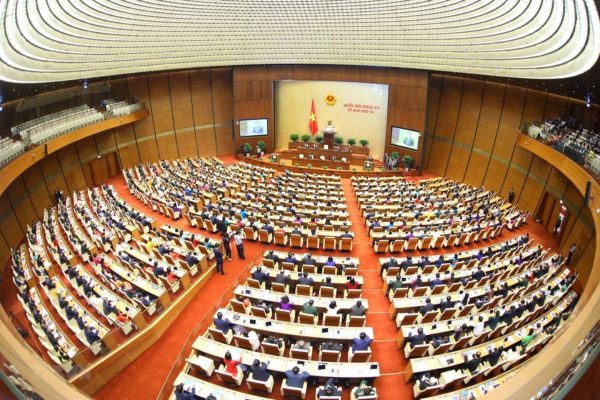The National Assembly Conducts a Confidence Vote for Which Positions? What Are the Principles for Conducting a Confidence Vote for Positions Elected or Approved by the National Assembly?
National Assembly Votes of Confidence for Which Positions?
Based on Article 2 of Resolution 96/2023/QH15, the following is stipulated:
Subjects of Votes of Confidence
1. The National Assembly holds votes of confidence for individuals holding the following positions:
a) President, Vice President;
b) Chairperson of the National Assembly, Vice Chairpersons of the National Assembly, Members of the Standing Committee of the National Assembly, Secretary-General of the National Assembly, Chairperson of the Ethnic Council, Chairpersons of Committees of the National Assembly;
c) Prime Minister of the Government of Vietnam, Deputy Prime Ministers of the Government of Vietnam, Ministers, and other members of the Government of Vietnam;
d) Chief Justice of the Supreme People's Court, Chief Procurator of the Supreme People's Procuracy, State Auditor General.
2. The Provincial and District People's Councils hold votes of confidence for individuals holding the following positions:
a) Chairperson of the People's Council, Vice Chairpersons of the People's Council, Heads of Committees of the Provincial and District People's Councils;
b) Chairperson of the People's Committee, Vice Chairpersons of the People's Committee, and Members of the Provincial and District People's Committees.
3. The National Assembly, the People's Councils vote of confidence for individuals holding positions elected or approved by the National Assembly, People's Councils in cases stipulated in Article 13 of this Resolution.
4. In cases where an individual simultaneously holds multiple positions listed in Clause 1 or Clause 2 of this Article, the vote of confidence is conducted once for all those positions.
5. Votes of confidence are not conducted for individuals holding positions listed in Clause 1 and Clause 2 of this Article who have announced retirement or those elected or appointed in the year of the vote of confidence.
Thus, the National Assembly conducts votes of confidence for individuals holding the following positions:
- President, Vice President;- Chairperson of the National Assembly, Vice Chairpersons of the National Assembly, Members of the Standing Committee of the National Assembly, Secretary-General of the National Assembly, Chairperson of the Ethnic Council, Chairpersons of Committees of the National Assembly;- Prime Minister of the Government of Vietnam, Deputy Prime Ministers of the Government of Vietnam, Ministers, and other members of the Government of Vietnam;- Chief Justice of the Supreme People's Court, Chief Procurator of the Supreme People's Procuracy, State Auditor General.

National Assembly votes of confidence for which positions? Principles for confidence votes on positions elected or approved by the National Assembly? (Image from the Internet)
Uses of Confidence Vote Results for Positions Elected or Approved by the National Assembly
Based on Article 12 of Resolution 96/2023/QH15, the following is stipulated:
Consequences for Individuals Subjected to Votes of Confidence
1. The results of votes of confidence are used to assess officials, serving as a basis for planning, mobilization, appointment, nomination, dismissal, and implementation of policies concerning officials.
2. An individual receiving more than half but less than two-thirds of the total votes with a “low confidence” rating may resign; if they do not resign, the Standing Committee of the National Assembly shall submit to the National Assembly, or the Standing Body of the People's Council shall submit to the People's Council to conduct a vote of confidence at that session or the nearest session; if an individual has been subjected to votes of confidence for multiple positions simultaneously, the vote of confidence shall be conducted once for all those positions.
3. An individual receiving two-thirds or more of the total votes with a “low confidence” rating shall be subjected to dismissal or approval for dismissal at that session or the nearest session by the body or person competent to nominate them for election or approval by the National Assembly or People's Council; if an individual has been subjected to votes of confidence for multiple positions simultaneously, the dismissal or approval for dismissal shall be conducted once for all those positions.
Thus, the results of votes of confidence for positions elected or approved by the National Assembly are used to assess officials, serving as a basis for planning, mobilization, appointment, nomination, dismissal, and implementation of policies concerning officials.
An individual receiving more than half but less than two-thirds of the total votes with a “low confidence” rating may resign.
If they do not resign, the Standing Committee of the National Assembly shall submit to the National Assembly to conduct a vote of confidence at that session or the nearest session; if an individual has been subjected to votes of confidence for multiple positions simultaneously, the vote of confidence shall be conducted once for all those positions.
An individual receiving two-thirds or more of the total votes with a “low confidence” rating shall be subjected to dismissal at that session or the nearest session by the body or person competent to nominate them for election or approval by the National Assembly.
If an individual has been subjected to votes of confidence for multiple positions simultaneously, the dismissal or approval for dismissal shall be conducted once for all those positions.
Principles for Confidence Votes on Positions Elected or Approved by the National Assembly
Based on Article 5 of Resolution 96/2023/QH15, the principles for confidence votes are as follows:
- Ensuring the rights and emphasizing the responsibilities of National Assembly deputies, People's Council deputies in conducting votes of confidence; ensuring the rights to report and explain of individuals subjected to votes of confidence.- Democratic, objective, impartial, open, and transparent; ensuring accurate evaluation of the performance, authority execution, political and ethical qualities, and lifestyle of individuals subjected to votes of confidence.- Ensuring the stability and efficiency of the state apparatus, and the leadership of the Communist Party in personnel work.
LawNet